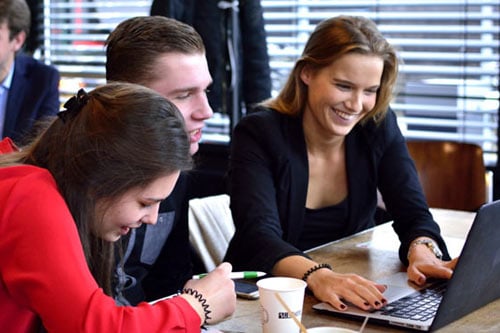Preparing students for the workplace after, typically, three/four years of academic study is one of many challenges Higher Education Institutions (HEIs) face when it comes to providing value for money in their degree programmes.
Students as 'Consumers'
For many students their choice of university is heavily influenced by their likely employment prospects/options upon graduation. Given the increases in tuition fees, their choice of university has become more of a monetary purchase above an intellectual investment. In this regard, students become more like 'consumers'.
And their 'purchase' of a university is not determined solely on their league table ranking nor the number of firsts or upper second class honours degrees awarded but on how many of their graduates end-up in full-time employment after those graduation gowns have been - hopefully - dry-cleaned.
The Skills Agenda
Developing employability skills in Higher Education is nothing new: Times Higher Education and QS Top Universities rank universities based on their graduates' employability potential; while many universities will proudly boast the percentage of their graduates in full-time employment within months of their graduation - Lancaster University, for instance, states 97% of their graduates are in employment or further study, six months after graduating.
Re-training, increased competition, and the death of the 'job for life'
And we didn't even mention, Covid-19 in that heading? The volatility of the labour market puts even greater emphasis on students being able to learn new skills and possess the character traits to succeed in an ever-competitive market. Employees need to adapt to increasing new demands from internal and external stakeholders i.e. employers, clients, investors. The 'job for life' concept is becoming increasingly redundant (pardon the irony) with frequent retraining and career changes becoming more apparent across not just graduates but other employees, as well - see Ian McIlwan's article in FE News for more on this topic.
"There are job titles that we see today that weren't around 10, 15, 20 years ago, so Cloud Engineer, Unity Developer, Automation Manager these were job titles which didn't exist back then."
Leon Lloyd, Edumundo
Okay, employability matters...
But how do we embed employability skills within either dedicated employability skills modules or existing course-related ones and how do we enable students to learn and develop these skills themselves?
Moving into a job after graduation is one thing, but moving into one with the soft-skills to develop a career, that's another.
Employability Skills Webinar
All of the above themes and questions we discussed and addressed on Tuesday 30th March, where we hosted our 'Developing Employability Skills in Higher Education' webinar together with three of our academic partners:
- Dr. Stacey Noble, Teaching Fellow and Module Director, Lancaster University Management School
- Nick Pronger, Lecturer and Director of BSc Marketing, Birkbeck University
- Wilco Dado, Senior Lecturer, Amsterdam University of Applied Sciences
Employability Weeks at Lancaster University
Dr. Stacey Noble provided an overview of her 'employability modules' at Lancaster University which involves around 400 students per year studying their BSc Accounting and Finance degree.
Within these modules students participate in the Phone Ventures management simulation which takes place over eight days. As Stacey explains: "The main focus of these [employability modules] is to facilitate team-work, organisation, leadership, and project management skills."
"I made a point to my students: 'Talk that up in your CV [remote, online team-working]. You're learning to do this at the same time as people that have already been established, so you will have an edge.'"
Dr. Stacey Noble
This outlined the benefits of Lancaster University's approach to using the management simulation as a tool for students to develop and practise their employability skills and not focus solely on their team's overall performance on the simulation.
Stacey concluded with some encouraging feedback from her students:
"I don't think I will ever get tired of playing the business simulation! The group work, competition, and the decision-making to operate a business were somewhat refreshing."
BSc Accounting and Finance Student, Lancaster University
So we've looked at how dedicated employability skills modules are applied at Lancaster University and how management simulations play a role in developing those skills, but what about those programmes that embed employability skills within existing modules.
Enter the stage, Nick Pronger...
Practical and Applied Learning at Birkbeck University
With around 150 students per year, Nick's BSc Marketing programme covers all the main modules to be expected within an undergraduate marketing degree: Consumer Behaviour, Principles of Marketing, Marketing Communications, Branding etc. But as Nick puts it: "We wanted something that was a little bit more applied. My idea behind this was that it was crazy to send out students [into the labour market] who cannot do marketing planning. A marketing simulation module involving marketing planning seemed vital."
The 'Marketing Simulation' module begins in the first year of the programme after students complete the 'Principles of Marketing' module, equipping them with key marketing theories that they can then utilise during the management simulation. Here, Nick's students used the My Marketing Experience simulation.
"I've heard from students that when they go to interviews those are the two things [marketing simulation and dissertation] that employers tend to ask questions about."
Nick Pronger
"The idea of skills development was that it was integrated into the simulation itself...the assessment is a group presentation at the end of the module and then a marketing plan based on the next three years of the company they managed in the simulation."
Of course, for many programmes there is so much to learn within them that students are often tasked with learning employability skills through self-study.
Our final session looked at the use of the Study Skills and Employability Skills Edubook at Amsterdam School of International Business (AMSIB).
'Professional Branding' Module Using the Study Skills and Employability Skills Edubook
When Wilco Dado's 'Professional Branding' module was reduced to an eight-week module rather than year-round, he was looking for a self-study e-book that would prepare students for class and could also measure students' engagement with the material.
Wilco used the Study Skills and Employability Skills Edubook to solve this problem. Here, students were tasked with covering the exercises in the Edubook, particularly learning theory in their own time and using class-time to do practical exercises and simulations.
"The beauty of the Edubook is that we can check whether students have prepared for class or not," referring to the Edubook's 'Tutor Dashboard' which provides analytics on student engagement within the book, detailing how much of the book has been covered, how many exercises have been completed, and how they performed on these exercises.
"Many students don't understand that soft skills development is important, or rather they do but only after they've finished their studies."
Wilco Dado
Flipping the Classroom
The self-study and the new workshop structure itself involved flipping the classroom. "They prepare for class individually and in many classes students have to prepare and present a presentation. They learn the content from the Edubook, they present it in class so everyone will learn from it, but also they practise their presentation skills."
Wilco concluded the session, reflecting on the module itself:
"It's still work to be developed but having said that it's good we have this setup of the programme because students come to class prepared, so in class, time is used more effectively. The use of the Edubook gives more weight to the course and justifies the number of ECs (European Credits) on the course."
And Finally, Thank you...
To all our guest speakers and attendees on the webinar, and to you, reader for reading this article.
For future updates on upcoming webinars and new blog articles, sign up to our newsletter.
Find Out More/Request a Demo
In this article, we referred to the following Edumundo products:
- Phone Ventures Management Simulation at Lancaster University
- My Marketing Experience (MMX) Management Simulation at Birkbeck University
- Study Skills and Employability Skills Edubook at AMSIB
Click on the highlighted links above to find out more about them and submit a free demo request or, if you would like a demo request of two or all three of these, please click the button below.



.png?length=300&name=unnamed%20(11).png)
.png?length=300&name=unnamed%20(7).png)
.png?length=300&name=unnamed%20(8).png)
.png?length=300&name=unnamed%20(6).png)

.png?length=300&name=unnamed%20(10).png)
.png?length=300&name=unnamed%20(5).png)
.png?length=300&name=unnamed%20(9).png)
.png?length=300&name=unnamed%20(4).png)
.png?length=300&name=unnamed%20(2).png)
.png?length=300&name=unnamed%20(1).png)
.png?length=300&name=unnamed%20(3).png)
.jpg?length=300&name=unnamed%20(2).jpg)





.png?length=300&name=loughborough-university-logo%20(small).png)





